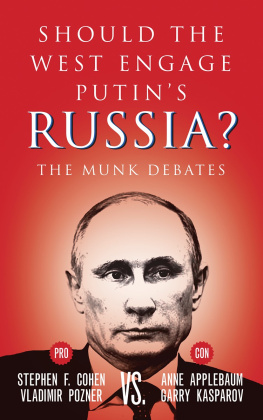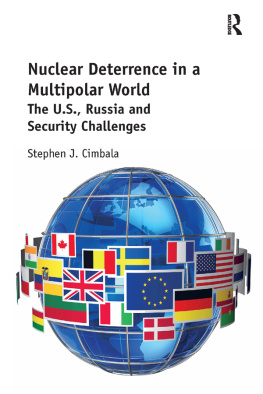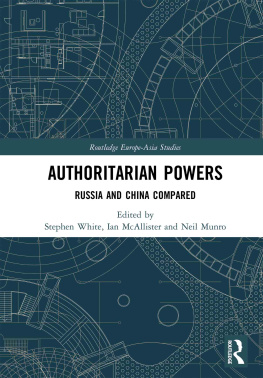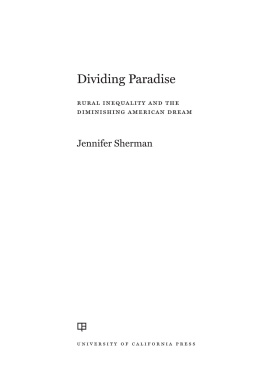Rural Inequality in Divided Russia
This book examines economic and political polarization in post-Soviet Russia, and in particular analyzes the development of rural inequality. It discusses how rural inequality has developed in post-Soviet Russia, and how it differs from the Soviet period, and goes on to look at the factors that affect rural stratification and inequality, using human and social capital, profession, gender, and village location as independent variables. The book uses survey data from rural households and fieldwork in Russia in order to highlight the multiplicity of divisions that act as fault lines in contemporary rural Russia.
Stephen K. Wegren is Professor of Political Science at Southern Methodist University, Dallas, USA. He is author or editor of 15 books and author or coauthor of more than 100 articles and chapters on communist and post-communist political economy.
Rural Inequality in Divided Russia
Stephen K. Wegren
First published 2014
by Routledge
2 Park Square, Milton Park, Abingdon, Oxon OX14 4RN
Simultaneously published in the USA and Canada
by Routledge
711 Third Avenue, New York, NY 10017
Routledge is an imprint of the Taylor & Francis Group, an informa business
2014 Stephen K. Wegren
The right of Stephen K. Wegren to be identified as author of this work has been asserted by him in accordance with the Copyright, Designs and Patents Act 1988.
All rights reserved. No part of this book may be reprinted or reproduced or utilised in any form or by any electronic, mechanical, or other means, now known or hereafter invented, including photocopying and recording, or in any information storage or retrieval system, without permission in writing from the publishers.
Trademark notice: Product or corporate names may be trademarks or registered trademarks, and are used only for identification and explanation without intent to infringe.
British Library Cataloguing in Publication Data
A catalogue record for this book is available from the British Library
Library of Congress Cataloging in Publication Data
Wegren, Stephen K.,
Rural inequality in divided Russia / Stephen K. Wegren.
pages ; cm. -- (Routledge contemporary Russia and Eastern Europe series ; 47)
1. Russia (Federation)--Rural conditions--Regional disparities.
2. Russia (Federation)--Rural conditions. 3. Equality--Russia (Federation)
4. Polarization (Social sciences)--Russia (Federation) I. Title. II.
Series: Routledge contemporary Russia and Eastern Europe series ; 47.
HN530.2.A8W44 2013
320.01'10947--dc23
2012051298
ISBN: 978-0-415-82587-0 (hbk)
ISBN: 978-0-203-76056-7 (ebk)
Contents
This is a book about inequality in rural Russia. Inequality has been a potent force throughout history, providing incentives that drive economic growth. Too much inequality, however, is a source of societal instability and serves as a grievance for revolutionary groups. Russia is more unequal now than at any time since Tsar Nicholas II resigned in 1917 and the nobility class had its wealth confiscated by the Bolsheviks. In the early twentieth century the Bolsheviks drew upon the mass anger at the tremendous inequality that existed in Tsarist Russia; combined with their program for social justice the Communists rode that anger to power. A century later, the rage that underlined social movements and revolution in the Middle East was in part motivated by societal inequality between the ruling elite and everyone else.
In Russia, the growth of inequality provides a yardstick for measuring distance from a communist economy and therefore is an important measure of institutional impact; only through taking advantage of new opportunities can stratification increase. Therefore, growing inequality offers concrete evidence about how market reform a new institutional structure affects the lives of millions. Inequality will continue to shape Russias economic and political development going forward.
I have been interested in inequality and its relationship to political stability for quite some time. One of the very first books I bought for personal interest as a freshman in college was entitled something like The Rich and Super Rich. As my career developed and I became an expert on Russia, I was moved by my observations and experiences during research trips over the past quarter century. I started going to Russia (then the USSR Union of Soviet Socialist Republics) in the late 1980s just as Gorbachevs economic reform loosened somewhat the strings of the planned economy. New incentives and opportunity appeared that would transform Soviet society. Before that time, everyone had the right to be equally poor. Gorbachevs reforms were followed by the introduction of market reform in 1992. As Russia became much more stratified and significantly more unequal, the standard of living declined for most Russians, while a few emerged as super-winners, or gladiators of capitalism as Freeland terms them. With my interest in the political economy of being rural those who are weak and vulnerable a book on rural inequality increasingly made sense as a way to sort through the incredible change that has occurred since 1992.
Perhaps one of the most salient moments occurred in 2001 during a trip to a village in Belgorod oblast. We were getting ready for the days work in a village and looked down the narrow semi-paved road to see a new Mercedes trying to pass a horse-led milk cart driven by a peasant woman. The cars driver was frustrated because the road was narrow and he could not get around the cart, even though he was obviously in a hurry. Only after the milk cart turned off the road into the processing factory could the driver go on his way. He had to adjust to rural time. The contrast between old Russia and new Russia was never more striking.
Over the years I began to wonder about how different variables influence the magnitude and intensity of inequality. One of the interesting questions is how inequality develops in formerly egalitarian societies. Inequality takes many forms and develops in different ways. It is obvious that Russia is much more unequal today, and considerable attention has been devoted to documenting that inequality. But as usual, most of the focus is on urban Russia and the rural sector is ignored. One of the mysteries to me is why area experts feel it is justifiable to ignore one-third of the population in their analysis. Thus, systematic, in-depth analysis of the impact of different factors on rural inequality is absent, a void that this book aims to fill. My goal, therefore, is quite simple: to understand the development of rural inequality in post-Soviet Russia. In that regard my intent was to situate the book within several broad theoretical and political issues: (1) the resilience and durability of authoritarian regimes; (2) New Institutionalism and the general theoretical question about the impact of reform institutions on behavior; and (3) peasant adaptation and the question of value embeddedness.
As is true for virtually any book, a number of individuals and institutions contributed either directly or indirectly to the completion of this project. It would be impossible to thank each individually, but three people warrant special mention. Valery Patsiorkovsky, and his wife Valentina, with whom I have worked since 1997, were invaluable for conducting surveys upon which much of the analysis herein is based. I also wish to thank my colleague and friend David OBrien with whom I have worked since 1997 and collaborated on Russian surveys in 2001, 2006, 2008, and 2009. From the beginning we developed a creative synergy that led to a very productive working relationship that has lasted many years. I have learned a tremendous amount from David, and I am very thankful for the opportunity to work with him.







